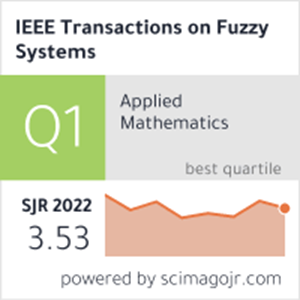Dissipativity-Based Integral Sliding Mode Control of Fuzzy Switched Positive Systems With Bumpless Transfer Performance
IF 11.9
1区 计算机科学
Q1 COMPUTER SCIENCE, ARTIFICIAL INTELLIGENCE
引用次数: 0
Abstract
Nonlinear switched positive systems (SPSs) subject to time-varying delays are ubiquitous in actual applications, whose control and synthesis are complicated due to the influence of positivity constraints, switching laws, and time delays. This article addresses the issues of dissipative sliding mode control and dissipativity-based sliding mode tracking control for fuzzy SPSs in the presence of time-varying delays under a state-dependent switching paradigm. First, a bumpless transfer technique and a hysteresis switching mechanism for fuzzy switched systems are employed to mitigate input chattering and avoid high-frequency switching, respectively. Then, a novel fuzzy integral switching sliding surface is formulated to accommodate the characteristics of nonlinear switched systems. Based on the multiple linear copositive Lyapunov function, sufficient conditions are derived to guarantee that the closed-loop positive system is asymptotically stable with strict具有无碰撞传递性能的模糊开关正系统的耗散积分滑模控制
具有时变时滞的非线性切换正系统在实际应用中普遍存在,由于正性约束、切换律和时滞的影响,其控制和综合比较复杂。本文讨论了状态依赖切换模式下存在时变延迟的模糊sp的耗散滑模控制和基于耗散的滑模跟踪控制问题。首先,采用无颠簸传递技术和迟滞切换机制分别缓解输入抖振和避免高频切换。然后,根据非线性切换系统的特点,构造了一种新的模糊积分切换滑动曲面。基于多重线性合成Lyapunov函数,给出了在该控制器下闭环正系统具有严格的$(q,r)$-$\alpha$耗散和无碰撞传递性能的渐近稳定的充分条件。在此基础上,利用所设计的模糊积分滑模曲面进行了耗散跟踪控制设计,保证了系统在正稳定性条件下的可达性。最后,通过Lotka-Volterra种群模型的两个算例验证了所提模糊滑模控制策略的可行性。
本文章由计算机程序翻译,如有差异,请以英文原文为准。
求助全文
约1分钟内获得全文
求助全文
来源期刊

IEEE Transactions on Fuzzy Systems
工程技术-工程:电子与电气
CiteScore
20.50
自引率
13.40%
发文量
517
审稿时长
3.0 months
期刊介绍:
The IEEE Transactions on Fuzzy Systems is a scholarly journal that focuses on the theory, design, and application of fuzzy systems. It aims to publish high-quality technical papers that contribute significant technical knowledge and exploratory developments in the field of fuzzy systems. The journal particularly emphasizes engineering systems and scientific applications. In addition to research articles, the Transactions also includes a letters section featuring current information, comments, and rebuttals related to published papers.
 求助内容:
求助内容: 应助结果提醒方式:
应助结果提醒方式:


